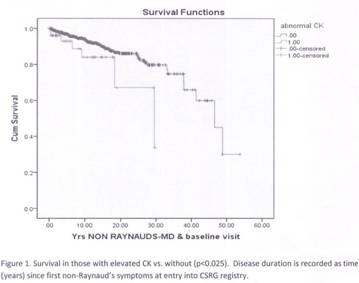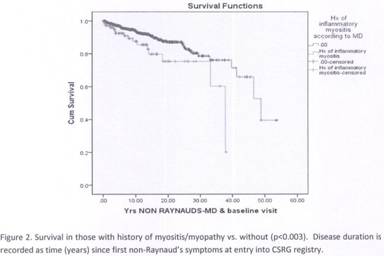Session Information
Session Type: Abstract Submissions (ACR)
Background/Purpose: Myopathy / myositis is associated with more severe systemic scleroderma (SSc). The aim of this study was to determine such clinical information from the Canadian Scleroderma Research Group database (CSRG).
Methods: Data from the CSRG are collected annually on SSc patients. Two surrogate markers for myopathy used in this study were elevated creatine kinase (CK) and physician-reported history of myopathy/myositis of the patients. Comparisons were made between those with and without myopathy/myositis to determine the strongest associations with this complication; overall, in lcSSc and dcSSc and in early dcSSc subset. Survival with and without myopathy/myositis was determined.
Results: The study included 1143 patients with mean of 8 years of duration. Elevated CK occurred in 5.6%; 9.7 % had a history of inflammatory myositis or myopathy according to physician; 5.7% had proximal muscle weakness. Those with elevated CK compared to remainder were more likely to be male (24.5 % in elevated CK vs. 12.6 % in normal CK; p<0.013), younger (51.93 vs. 56.07 years, p<0.045); have dcSSc, (40.4 % vs. 37.9 %; p<0.002), physician-reported history of myositis/myopathy (45.3 % vs. 8.5 %, p< 0.000), tendon friction rubs (30.0 % vs. 13.4 %; p<0.001), FVC < 70 % (23.9 % vs. 13.1 %; p<0.039), RNP antibody (12.0 % vs. 5.0 %, p < 0.032), Topo1 antibody (26.0 % vs. 14.4 %, p < 0.026), higher skin scores (MRSS 16.14 vs. 9.81; p<0.000), and higher HAQ score (0.98 vs. 0.79; p<0.011). When using logistic regression younger age male, dcSSc, early dcSSc, tendon friction rubs, higher MRSS, Topo1, RNP, PMScl, and FVC<70% were associated with elevated CK. Survival was less in those with myopathy/myositis or elevated CK (p=0.003 and p=0.025 respectively). Those with elevated CK had less survival (p=0.025). Results were similar when the other definition of myopathy/myositis.
Conclusion: Myopathy/myositis has a worse prognosis with respect to function and other organ involvement (ILD) and survival.
Disclosure:
M. Jung,
None;
M. Baron,
None;
M. Hudson,
None;
A. Bonner,
None;
J. E. Pope,
None;
« Back to 2012 ACR/ARHP Annual Meeting
ACR Meeting Abstracts - https://acrabstracts.org/abstract/myopathy-is-a-poor-prognostic-feature-in-systemic-sclerosis-results-from-the-canadian-scleroderma-research-group/


